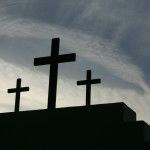Where Tradition and the Law Collide: Supreme Court to Consider Public Prayer

The Supreme Court never seems to disappoint a reality TV show loving public when it comes to reviewing controversial issues. The justices recently agreed to take on the role of public prayer in government during its 2014 term.
The Establishment Clause of the First Amendment states that “Congress shall make no law respecting an establishment of religion.” The clause is generally interpreted to mean that the government cannot establish an official religion or take actions that unduly favor one religion over another.
However, the constitutionality of prayers at government meetings is far less clear, in large part because it has been an accepted practice since the founding of our country. The current case before the Court, Town of Greece v. Galloway, alleges that the town’s ritual of starting board meetings with a prayer by a member of the local clergy (often a Christian) violates the Establishment Clause.
The Second Circuit Court of Appeals agreed, ruling that “a legislative prayer practice that, however well-intentioned, conveys to a reasonable objective observer under the totality of the circumstances an official affiliation with a particular religion, violates the clear command of the [First Amendment’s] Establishment Clause.”
The Supreme Court last considered the role of prayer in government in 1983. March v. Chambers involved a legal challenge to the Nebraska state legislature’s practice of starting its sessions with a prayer by a chaplain paid by the state. The Supreme Court ultimately concluded that practice did not violate the Establishment Clause. However, its decision was based largely on tradition rather than the law.
The Court’s opinion noted that it would be unfair to find Nebraska’s opening prayer unconstitutional when “the practice of opening sessions of Congress with prayer has continued without interruption for almost 200 years ever since the First Congress drafted the First Amendment.”
As further explained in the majority opinion, “In light of the history, there can be no doubt that the practice of opening legislative sessions with prayer has become part of the fabric of our society. To invoke divine guidance on a public body entrusted with making the laws is not, in these circumstances, a violation of the Establishment Clause; it is simply a tolerable acknowledgment of beliefs widely held among the people of this country.”
No current member of the Court was serving when Marsh was decided. Accordingly, the justices will be able to put their own stamp on this controversial issue.
Previous Articles
SCOTUS Decision in Bowe v. United States Is First of the 2026 Term
by DONALD SCARINCI on February 5, 2026
In Bowe v. United States, 607 U.S. ___ (2026), the U.S. Supreme Court held that Title 28 U.S.C. § ...
SCOTUS Rules State Can’t Immunize Parties from Federal Civil Liability
by DONALD SCARINCI on January 29, 2026
In John Doe v. Dynamic Physical Therapy, LLC, 607 U.S. ____ (2025) the U.S. Supreme Court held that...
Supreme Court to Address Racial Discrimination in Jury Selection
by DONALD SCARINCI onWhile the U.S. Supreme Court has concluded oral arguments for the year, it continues to add cases t...
The Amendments
-
Amendment1
- Establishment ClauseFree Exercise Clause
- Freedom of Speech
- Freedoms of Press
- Freedom of Assembly, and Petitition
-
Amendment2
- The Right to Bear Arms
-
Amendment4
- Unreasonable Searches and Seizures
-
Amendment5
- Due Process
- Eminent Domain
- Rights of Criminal Defendants
Preamble to the Bill of Rights
Congress of the United States begun and held at the City of New-York, on Wednesday the fourth of March, one thousand seven hundred and eighty nine.
THE Conventions of a number of the States, having at the time of their adopting the Constitution, expressed a desire, in order to prevent misconstruction or abuse of its powers, that further declaratory and restrictive clauses should be added: And as extending the ground of public confidence in the Government, will best ensure the beneficent ends of its institution.





